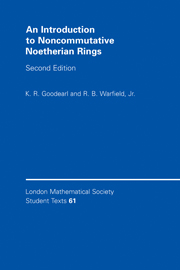Book contents
- Frontmatter
- Contents
- Introduction to the Second Edition
- Introduction to the First Edition
- Prologue
- 1 A Few Noetherian Rings
- 2 Skew Polynomial Rings
- 3 Prime Ideals
- 4 Semisimple Modules, Artinian Modules, and Torsionfree Modules
- 5 Injective Hulls
- 6 Semisimple Rings of Fractions
- 7 Modules over Semiprime Goldie Rings
- 8 Bimodules and Affiliated Prime Ideals
- 9 Fully Bounded Rings
- 10 Rings and Modules of Fractions
- 11 Artinian Quotient Rings
- 12 Links Between Prime Ideals
- 13 The Artin-Rees Property
- 14 Rings Satisfying the Second Layer Condition
- 15 Krull Dimension
- 16 Numbers of Generators of Modules
- 17 Transcendental Division Algebras
- Appendix. Some Test Problems for Noetherian Rings
- Bibliography
- Index
15 - Krull Dimension
Published online by Cambridge University Press: 11 November 2010
- Frontmatter
- Contents
- Introduction to the Second Edition
- Introduction to the First Edition
- Prologue
- 1 A Few Noetherian Rings
- 2 Skew Polynomial Rings
- 3 Prime Ideals
- 4 Semisimple Modules, Artinian Modules, and Torsionfree Modules
- 5 Injective Hulls
- 6 Semisimple Rings of Fractions
- 7 Modules over Semiprime Goldie Rings
- 8 Bimodules and Affiliated Prime Ideals
- 9 Fully Bounded Rings
- 10 Rings and Modules of Fractions
- 11 Artinian Quotient Rings
- 12 Links Between Prime Ideals
- 13 The Artin-Rees Property
- 14 Rings Satisfying the Second Layer Condition
- 15 Krull Dimension
- 16 Numbers of Generators of Modules
- 17 Transcendental Division Algebras
- Appendix. Some Test Problems for Noetherian Rings
- Bibliography
- Index
Summary
Krull dimension is a measurement of size of a ring that has an intrinsic importance of its own and is also a useful technical tool in the theory of noetherian rings. We have already discussed in the previous chapter the “classical” Krull dimension, which originated in commutative ring theory and is defined using the prime ideals of a ring. In the noncommutative theory, we need a notion of Krull dimension that does not depend on prime ideals, but which shares many of the important properties of the classical Krull dimension for commutative rings. For instance, we would like a notion of Krull dimension that gives some useful information even for simple rings. This is done by defining a dimension on modules rather than just on rings, which has the advantage that it in some sense replaces considerations involving two-sided ideals with considerations involving only one-sided ideals. The definition now used is due to Rentschler and Gabriel and will be defined in detail in the next section. While at first sight it appears completely unrelated to the classical definition, we shall see that it coincides with the classical Krull dimension on commutative noetherian rings and, in fact, on FBN rings.
Information
- Type
- Chapter
- Information
- An Introduction to Noncommutative Noetherian Rings , pp. 255 - 273Publisher: Cambridge University PressPrint publication year: 2004
